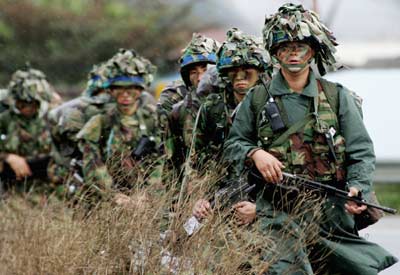DPRK 'has no plan for second nuke test'
Seoul, South Korea - North Korea (DPRK -- Democratic People's Republic
of Korea) warned South Korea against joining international sanctions, saying
Wednesday that its neighbor would "pay a high price" if it joins the US-led
drive to punish the nation for its nuclear test. (More on North Korea Nuke Issue )
The statement from the North's Committee for the
Peaceful Reunification of the Fatherland came as South Korea struggles to
determine how it should enforce the UN sanctions, including whether to help
interdict North Korean cargo ships suspected of transporting materials for
unconventional weapons.

Soldiers march during a military exercise in Pochon,
about 46 km (29 miles) northeast of Seoul, October 23, 2006. North Korea
warned South Korea against joining international sanctions, saying
Wednesday that its neighbor would "pay a high price" if it joins the
US-led drive to punish the nation for its nuclear test. [Reuters]Photo Gallery on DPRK Nuke
Issue
|
"If the South Korean authorities end up joining US-led moves to sanction and
stifle (the North) we will regard it as a declaration of confrontation against
its own people ... and take corresponding measures," the North's Committee for
the Peaceful Reunification of the Fatherland said in a statement.
US President Bush dismissed North Korea's statement, saying leader Kim
Jong Il was probing for weaknesses in the international community.
"The leader of North Korea likes to threaten," Bush told reporters in
Washington. "In my judgment, what he's doing is testing the will of the five
countries that are working together to convince him there's a better way forward
for his people."
The UN Security Council unanimously adopted a sanctions resolution five days
after the North's Oct. 9 test, and a South Korean task force met this week to
determine how the country should address the measures, including what to do
about joint economic projects with the North.
South Korea's participation in the sanctioning the North is important because
the country is one of the main aid providers to the country, along with China.
But both countries have been reluctant to impose stern measures against their
neighbor. China voted for the resolution but is concerned that excessive
measures could worsen the situation. South Korea has expressed similar concerns,
although there was no immediate response to Wednesday's statement from North
Korea.
"If North-South relations collapse due to reckless and imprudent sanctions
against us the South Korean authorities will be fully responsible for it and
will have to pay a high price," said the statement, carried by the North's
official Korean Central News Agency.
A top US diplomat said North Korea's test has brought China and the United
States closer together and both countries want a unified response.
"China has been in a very important relationship with us for many years and
at no time did we feel any closer together with China than we felt in the wake
of the North Korea provocation," US Assistant Secretary of State Christopher
Hill told reporters during a meeting of Pacific leaders in Fiji.
"I think the Chinese understand that the North Korean ... decision to proceed
with a nuclear weapons program is really something quite beyond the pale and
something we need to all speak with one voice about," said Hill, the chief US
envoy to six-nation talks on North Korea's nuclear program.
The resolution gave member countries 30 days from its Oct. 14 adoption to
report on implementing the sanctions.
The South Korean panel, which met for the first time Tuesday, also is trying
to decide how to handle the interdiction of North Korean cargo ships and what to
do about the economic projects that have been criticized for providing hard
currency to the North. The United States suspects the funds might have helped
the North's arms programs.
One is a tourism program run by South Korea at North Korea's Diamond Mountain
and the other is a South Korean-run industrial complex in the North Korean city
of Kaesong. The North has received at least US$900 million under the projects
since the 1990s.
South Korea prizes the projects as symbols of reconciliation and has been
unwilling to halt them. But it plans to make adjustments to meet Seoul's
requirements under the sanctions.
Also at issue was whether South Korea would expand its participation in a
US-led drive to interdict North Korean ships and aircraft suspected of carrying
weapons of mass destruction or related material.
South Korea has been reluctant to participate fully in the Proliferation
Security Initiative because of concerns it could lead to clashes with North
Korea and undermine efforts to persuade the state to give up its
nuclear program through diplomacy.
South Korea has only sent observers and attended briefings on the program.
South Korean Unification Minister Lee Jong-seok, a strong supporter of
engagement with North Korea, offered to resign Wednesday because of the nuclear
test. Critics have accused Lee of being too supportive of North Korea, but even
if his resignation is accepted, it is not likely to lead to any immediate change
in the South's engagement policy.
Russian President Vladimir Putin, meanwhile, also warned that pressuring the
North could backfire.
"One should never lead the situation into an impasse, one should never put
one of the negotiating sides in a position from which it virtually has no way
out but one: an escalation of the situation," Putin said in televised comments
broadcast in Moscow.